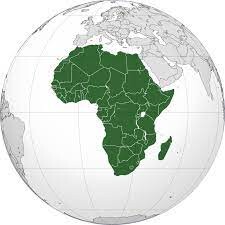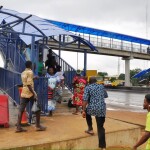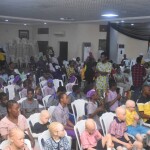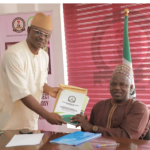As the haves take from the have-nots in Africa foundering in a quagmire of debt, little thought is spared the poorest of the poor
Gbenga Ogundare
Aanu-Oluwa Yinka was gutted when he went to some local government authorities recently to advocate for social benefits for his group of vision-impaired community residing at the Ifako-Ijaiye Local Council Development Area of Lagos State. “They told me my people had been coming one by one to get what they could: a ‘cup’ of rice, a bag of noodles, and N2000 for transportation,” he told ER during the October 15 International White Cane Day commemoration in Oshodi.
He was angry.
“There is a social protection programme that ought to benefit the entire PWD cluster if we work it collectively. But people go to demand what is good for them. Not for us.”
He might not have figured out the likes of World Bank and IMF spreading the social protection agenda, which the developing countries have bought into, largely on credit, are actually out to get what is good for them in their relationship with these countries. Not what is good for the debtors.
In Nigeria, it’s still difficult to evaluate how much the programme has been good for Yinka and more than 30 million like him since 2019. Following the aftershock of the Covid-19 pandemic, social protection became more necessary than it was in the previous administration that started it with the help of the World Bank. The federal government has since been doling out cash and handing out foodstuff at intervals. The Nigeria Association of the Blind (NAB) got 10 bags of rice in the most recent round. Its chairman Lukman Salami said he was still at a loss on how to share them to over half a million registered members of his cluster—not to talk of other blind citizens across the state. “Most of them are people who lost their sight in their later years—and lost their livelihood, marriages, and others, too, as a result,” the lawyer said.
The government safety net doesn’t cover the PWDs directly. According to the National Bureau of Statistics, Nigeria spent $5bn to fight poverty between 2016 and 2021. The World Bank provided $800 million of this specifically for social safety nets. And, the statistics body said, the spending benefitted only 6 percent of the targeted population, generally believed to be the vulnerable and the extremely poor. So there’s little the PWDs, a mere appendage to the major beneficiaries, can get from the food distribution, cash transfers, and others. Yet the United Nations 2006 Convention on the Rights of Persons with Disabilities (CRPD) emphasizes the importance of social protection in the efforts to alleviate poverty and promote the full and effective participation of persons with disabilities.
But the unexpected may soon happen. The ten bags of rice and the measly N2000 ($2) members of the disability communities stiffed out of the government programmes will be at stake. The fear of this and more dominated conversations in Marrakech, Morocco, between October 9 and 15 during the IMF/World Bank meeting. International NGOs, including ActionAid, and other development groups heckled the Bretton Woods Twins for asking the countries they pushed into the social protection drive to consider their debt overhangs—at this time. Debt servicing ballooned to $500 billion over four years, starting from 2022. That is about 8 percent of Africa’s GDP. And the creditors, including the IMF, the World Bank, Paris Club, China, and other international finance institutions, know the amount is more than its education and health budgets combined.
Nigeria spends almost 100 percent of its revenue to service its debt currently standing at $43 billion (external) and $70.3 billion (internal). Many fear this is enough to plunge it and a score of other indebted African countries already on the brink into debt crisis.
To meet any obligation now, the debtor countries will have to batten down the hatches, and make life severer for their citizens, including the PWDs. That expectation formed the core of ActionAid’s recent report: Fifty Years of Failure—the IMF, Debt and Austerity in Africa. The acuteness of the resulting poverty from the expected austere measure in Nigeria, especially, demands attention. Close to 100 million of the population there already live in multidimensional poverty. Millions of others abound across the continent.
Which was the reason many failed to see the prospect when Kristalina Georjiva, the managing director of the IMF, said during the meeting, "A prosperous world economy in the 21st century requires a prosperous Africa." The tangible prosperity the continent made in 10 years filed out in the wake of Covid-19 and the Russia-Ukraine war. With half of the sub-Saharan Africa in deep waters now, thanks to debts incurred on the progress now retarded, the future holds nothing but anxiety.
The IMF experts have advised the African countries hurtling down to avoid landing, and plunging the continent, into crisis. IMF’s Africa Department senior economist Fabio Comelli and five others suggested mobilizing internal resources, ensuring faithful implementation of budget, mobilizing people to support measures, and ensuring fiscal adjustment. Africa likes to cut back on expenditures in situation like this, Comelli and others wrote in an article—How to Avoid Debt Crisis in Sub-Saharan Africa—late September. Their characterization of Africa this way somewhat pre-empted the ActionAid report already concluded the lenders would call for huge cuts in public spending, and demand the citizens tighten their belts, instead of finding a mutually benefitting way of recovering their loans—like debt restructuring. But fiscal adjustment can only make sense to a low-income country in terms of austerity—to live way below their means.
Part of such fiscal adjustment is the fuel subsidy removal in Nigeria. The IMF and the World Bank had been consistent in their calls for the removal. The spinoff includes the weakening of the naira and the upward spiralling inflation.
The first casualties of such measures are health, education, and welfare programmes. Government workers in these sectors will be battling inflation that whittles down the purchasing power of their salaries, and yet have no pay raise. Nigeria’s inflation, for instance, stands at 26.72 percent. Ghana, the most indebted, has 46 percent, Sudan, 71 percent. Citizens’ abilities to meet their needs these sectors provide are also at risk in many of these countries.
About $1billion is going into one of Nigeria’s social protection programmes: the conditional cash transfer currently running. Humanitarian Affairs Minister Beta Edu claimed 15 million households will benefit from it for three months, translating to 61 million Nigerians. No amount is specifically voted for the PWDs. But, all the same, the beneficiaries will grapple with similar challenges. And the worst hit will be the PWDs who rely on potluck—as they mostly do in low income countries. About 30 percent of them there can access the benefits, compared to over 90 percent in the developed countries.
It took a great deal of threat and civil rebellion to chisel this relief off the Nigerian government. The new administration of President Bola Tinubu promised to go big on welfare packages, though. It will be clearer soon how much of IMF’s fiscal adjustment advisory Nigeria is willing to heed when the 2024 budget becomes law. If the vote for social protection rises, it does so on credit, still. If it falls, it won’t surprise many in the disability community.
Before now, the National Commission for Persons with Disabilities (NCPWD) appropriated N1.699 billion in 2023, almost 50 percent lower than the N3.17 billion voted for it last year. The first year it started proposing its own budget in 2021, the commission got N1.79 billion. There is no data on how much the federal government released to fund the budget in those three years. Certainly, the grand total is not enough to meet the PWDs’ peculiar needs and rights—not to talk of funding a social safety net for them.
Yinka is not a government lackey. But he thinks whatever little platform the government provides—like the social protection programme—for the citizens, it’s the responsibility of the disability community to work it to their own benefit, too.
Some fiscal adjustment will soon rock the platform to its foundations. The disruption is not unexpected. But neither the government nor the disability community will be able to hold it together sitting down.







